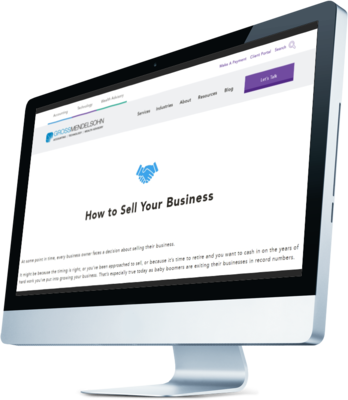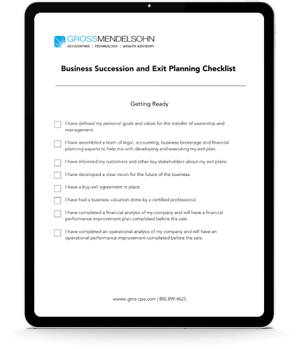How Much Is My Business Worth?
If you're approaching retirement or just want to move on to a new endeavor, you might be thinking about transferring the business to a family member, or selling it to a key employee or outside buyer.
Regardless of how you plan to exit your business, it's absolutely critical that you know how much it's worth.
It's unusual to find a case where a business owner wasn’t a little surprised to learn the true value of their business.
This guide explores common myths related to business value. We’ll consider different aspects of the valuation process to help give you a better understanding of the factors that come into play in determining what your business is worth.
Read the Full Guide Below
![]()
Don't Have Time To Read The Guide Now?
MYTH #1
There's only one way to value a business.
Wrong!
There are three basic approaches commonly used in valuing a business. They are commonly known as the income, market and asset approaches. Within each of these general approaches, there are different methods that can be used to arrive at a value.
So, which valuation approach is right for your business? That’s where your business valuation expert comes in. A good valuator will choose the approaches and methods to use based on professional judgment after considering many factors, including the purpose of the valuation, and the availability and reliability of data.
The objective of using more than one approach is to develop mutually supporting evidence to the conclusion of value.
The valuator will reconcile the values determined under the methods used to arrive at a final conclusion of value.
What You Should Know When You Need A Business Valuation

MYTH #2
Businesses can be valued simply by applying rules of thumb.
While rules of thumb are sometimes used by valuators as a sanity check after valuing a business via other methods, it is wrong to use a rule of thumb as the primary method of determining value. Rules of thumb assume an “average company” in the industry, but a single closely-held business like yours is not really average.
For example, there is a good chance your industry is broad enough to encompass a variety of entities that combine to offer a much broader group of products and/or services than your company offers.
Conversely, your company might have offerings that are broad enough to cross over into multiple industries. And even if your company does fit reasonably well in an industry, its historical financial results will probably vary from the industry averages in significant ways, as will its future prospects.
In addition, geography and regional and local economies are likely to have more of an influence on your company than the national outlook, which would be more applicable to the overall industry.
We've seen more than one client hurt by using a rule of thumb in a buy-sell agreement rather than relying on a professional valuation. In most of these instances, the company has been forced to repurchase the shares of a departing stockholder, whether from retirement, disability or another reason, at a significantly inflated value although it sometimes does work in reverse.
14 Lessons For Selling A Business

MYTH #3
There is only one value for your business.
Determining a value for an ownership interest in a company with uncertain future prospects is highly speculative.
Because business valuation is not an exact science, it would be unrealistic to expect a single final definitive number. Recognizing this, professional standards allow valuators to report their conclusion of value in the form of a range rather than a single number.
Of course, while there is no set formula to be used in valuing a business, there are accepted methods that, when applied with sound judgment and considering all the relevant facts, will permit the valuator to arrive at a reasoned defensible value.
Even a value derived from the correct application of professional standards can be widely different from what a specific buyer or seller thinks it should be.
This can result from many factors, including differences of opinion as to anticipated future cash flows, the achievability of projections, the risk of loss in the future, required rates of return, perceived economic and industry risks, and other assumptions.
I will never forget the first time I had to review a valuation performed by another firm for the employee stock ownership plan (ESOP) of one of my clients. (I couldn’t perform the valuation because our firm conducted the audit for the company, creating a conflict of interest.) Because I represented them for years, I knew my client’s history and had a general idea as to what the company was worth.
When I received the report from the valuator, however, the value was significantly higher than what I expected, and the potential ramifications for the ESOP were substantial. After digging into the details of the report and the assumptions used for risk, growth rates, etc., I was able to see how they had arrived at the value. That was fairly easy. The next step, which was more difficult, involved evaluating the reasonableness of the assumptions and the final value. While I thought some of the assumptions were very optimistic, I could not say categorically they were incorrect, even though the final result was approximately 20% higher than mine would have been. I ultimately came to understand there is no one right answer and that their value was within an acceptable range of values for the company.
4 Critical Tax Consequences To Consider When Selling Your Business

MYTH #4
All value is relative.
When asked how much something is worth, some people answer, “It’s worth whatever someone will pay.”
Even though there is no precise value for a given business interest, we do not ascribe to the premise that, as in the case of a painting or other piece of art, value is completely subjective. Businesses do have an intrinsic value based on the future economic benefits they can provide.
As we already discussed, the value of the business will vary greatly from one buyer to another based on their individual expectations of future performance and assessment of risk associated with those expectations.
However, a buyer will expect to receive their initial investment back with a reasonable return over a fairly short timeframe.
MYTH #5
All businesses are sellable.
There are some businesses that operate for a long time without ever paying the owner a return on his or her investment. Sure, the company has (hopefully) paid the owner a salary, but unless that salary and other benefits exceed the market value salary for what the owner is doing on a day-to-day basis, the owner may just be creating his or her own job.
If you own a business and work in it, you are entitled to both a reasonable salary for the work you perform as an employee and a reasonable return on your investment.
Think about it in terms of lost opportunity costs. What other investments could have been made with the money you initially invested in your business? What could you have done with the earnings you left in the company, and what returns would have been received on those investments?
You probably expected to make a fair return but if it has not happened for you, why would someone else make the same investment? When you think of it this way, it’s easy to see that all businesses are not sellable.
We’ll talk more about goodwill in Myth #7 and Myth #8, but it’s worth noting here that personal versus entity goodwill, and past performance versus future expectations, come into play when determining how sellable a business is. You might have a very profitable business that is only successful due to the efforts of you, the owner.
It doesn’t make sense for someone to buy a business whose clients are likely to leave (and as a result whose profits are likely to disappear) once the owner exits the business.
In cases like this, where personal goodwill is linked to the success of the business, the buyer should get a commitment from the seller that he or she will continue to work for a certain period of time to transition the business.
Other businesses are not sellable simply because they are so easy to start from scratch; in these cases, there is no real benefit to acquiring an existing company.
Exit Planning Checklist

MYTH #6
Buyers are paying for your past performance.
Unless you are selling your business based on its adjusted net asset value, the past performance of the company is irrelevant in a strict sense.
You are selling the future earnings of the business, and past performance is only meaningful because it can help predict future results. Whether the purchase price is based on a multiple of revenues, an EBITDA (earnings before interest, taxes, depreciation and amortization) multiple, or a discounted cash flow projection, past performance can be used if it identifies a trend that is likely to repeat.
All things being equal, the more consistent your past performance, the easier it will be to evaluate the future prospects of the company. And the more confidence a buyer has in the likelihood of future performance, the higher the price they will pay for those anticipated future earnings.
No matter what level of confidence the buyer has in the future of the company, it is the company’s future that is being acquired.
Nothing illustrates this better than looking at two of my clients who found themselves in opposite positions. The first was a company that had years of excellent profitability serving one client who represented substantially all of its business. As the saying goes, all their eggs were in one basket. One day, that company decided to move its work to another provider and within a year our client closed its doors and liquidated.
Although the company had an impressive history of earnings, it could not remain in business after the loss of its single client. As a result, no one would purchase the company when the historical earnings could not continue.
My other client was fortunate to find itself the target of a large international company looking to expand significantly in the United States.
The target company had a history of reasonable but not extraordinary returns selling a product that complemented those of the acquirer. This company was purchased for what equated to an outrageously high multiple of its prior year’s earnings (which were the highest in its history).
Without knowing all of the facts, this seemed to make no sense. However, discussions with the acquiring company’s management team revealed projected increases in revenues and earnings resulting from the acquisition, which would make the purchase price very reasonable assuming the future earnings materialized.
MYTH #7
Goodwill always has economic value.
If you’ve been in business for any length of time, you’d like to think you have created a certain amount of goodwill within your market.
Consider this scenario: You work hard to provide a good product and/or to provide superior service. You are active in the community, and people speak well of you and your business. You’ve developed loyal repeat customers who go out of their way to patronize you. We will assume these items collectively indicate the presence of goodwill. But does that goodwill have economic value?
We have all seen people on the local news lamenting the closing of an iconic neighborhood business, even rallying to try and save it at the 11th hour. The business has been around for 30, 40 or 50 years, is a neighborhood icon, known for its friendly service and quality products, but it closes because it cannot make a profit. Does this business not have goodwill?
The National Association of Valuators and Analysts Professional Standards defines goodwill as “that intangible asset arising as a result of name, reputation, customer loyalty, location, products and similar factors not similarly identified.”
Goodwill can be developed internally over time, or purchased. Internally developed goodwill is not recorded as an asset on a company’s financial statements. Purchased goodwill is recorded as part of a business acquisition or merger in an amount by which the acquisition price exceeds the fair market value of all separately identifiable assets.
Purchased goodwill would necessarily have economic value, but what about internally generated goodwill?
Another way of thinking about goodwill is in terms of excess earnings. Investment guru Warren Buffett describes economic goodwill as “the capitalized value of a return in excess of market rates.” Excess earnings exist when an assembled group of assets (for our purposes, a business) yields higher returns than other entities in the industry.
Once all tangible and intangible assets other than goodwill (trade names, patents, trademarks, assembled workforce, etc.) are adjusted to their fair market values, any return on the assets above the normal return for similar groups of assets is considered attributable to goodwill.
So, while accounting standards dictate that goodwill has economic value, owners should be aware that the generic goodwill an owner has created over the years only has economic value if the business generates excess returns.
MYTH #8
All goodwill is sellable.
Let’s assume your company does have goodwill with real economic value to you. An important second question is whether that goodwill is transferrable.
The issue of entity goodwill vs. personal goodwill is hotly debated in marital dissolution and shareholder dispute cases. In these cases, a business owner will frequently make the argument that any goodwill that exists relates directly to his or her efforts and individual name, rather than the efforts of other employees and the business’s name.
This isn’t just a negotiation tactic used to minimize a settlement value. It is often a fact, especially with service businesses. Clients will frequently choose the attorney, accountant, consultant, designer or other professional for their individual talents, and not because of the firm they are associated with. While it is important that the professional is associated with a firm that can provide the resources and support he or she requires, the client chooses to work with the individual. While this can be beneficial in minimizing the value of the business for certain purposes, it is not good if you are trying to sell your business. No buyer is going to pay for goodwill that is likely to leave the business with the seller.
The key to making goodwill sellable is to “institutionalize” it. In other words, clients need to become clients of the company or firm, so when someone asks them who their attorney, CPA or other professional is, they reply with the name of the firm and not the individual.
MYTH #9
Someone will offer you cash for your business.
Although some businesses do sell for cash, many small business owners find it necessary to hold a note in order to maximize the sales price, or in some cases, to make any sale possible. This is often the case when an owner decides to sell the business to a key employee.
Most employees do not have the net worth to either buy the business or obtain bank financing for the purchase. Holding a note can achieve the owner’s goal of seeing someone continue to operate the business in a manner consistent with his or her wishes and still get a fair price.
In today’s world of artificially low interest rates, the interest on a note can also provide additional returns to the seller.
About the Author
David Lanchak, CPA, CVA
David is a partner at Gross Mendelsohn. As a business owner himself, David enjoys serving as a sounding board for clients and helping them navigate the sale or purchase of a business. Learn more about David here.
